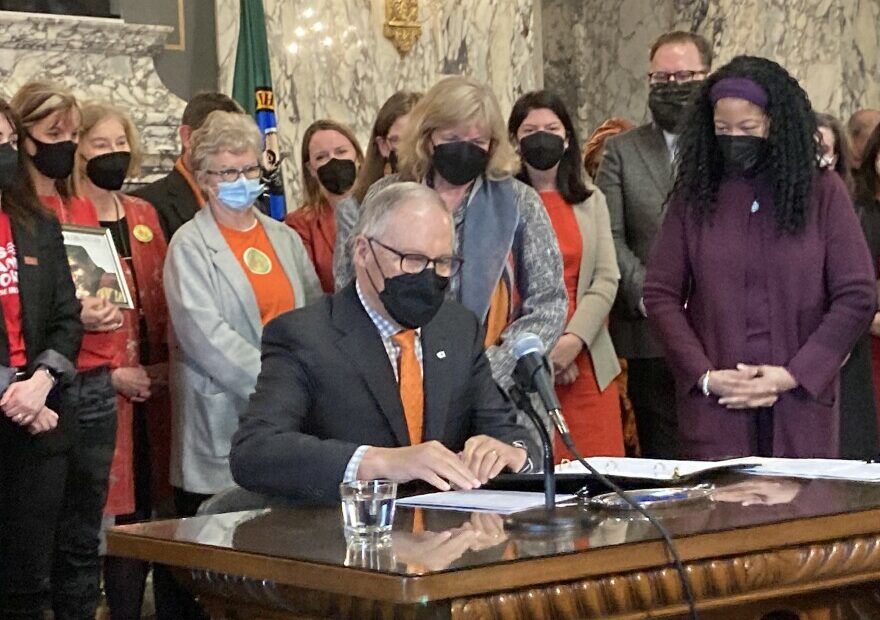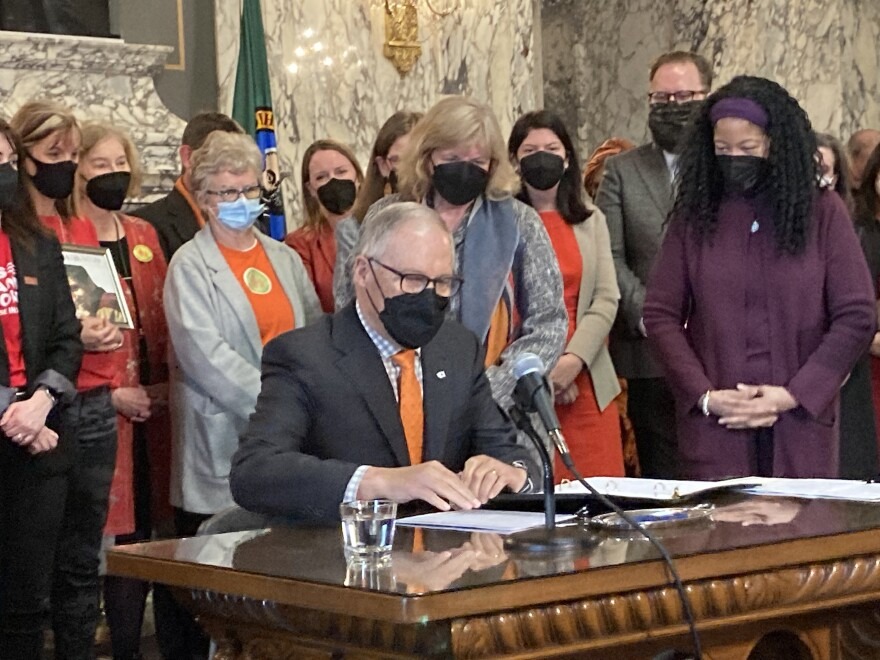Listen: Austin Jenkins reports on reaction to Gov. Inslee signing three gun-related bills into law / Runtime – 1:52
READ
Washington Gov. Jay Inslee on Wednesday signed into law three gun-related bills, including one that will prohibit the sale of gun magazines that hold more than 10 rounds of ammunition.
The other measures place new restrictions on untraceable “ghost guns” and, in response to concerns about “armed intimidation,” restrict weapons at locations such as school board meetings and election-related facilities.
In a sign of the importance Inslee places on these new laws, the bill signing ceremony took place in the rarely used State Reception Room at the Capitol in Olympia.
“This is a triumph, I believe, in democracy because the will of the vast majority of Washingtonians is being followed with the passage of these bills,” Inslee said before signing the measures. “For too long narrow segments of folks have blocked the majority will when it comes to saving us from this mass violence.”
Among those in attendance at the ceremony were Attorney General Bob Ferguson, Democratic state legislators and individuals who’ve been affected by gun violence.
“This restriction on the high-capacity magazines will force a shooter to reload after a maximum of ten rounds; that delay can be a game-changer,” said Paul Kramer, whose son Will was the lone survivor of a shooting at a home in Mukilteo in 2016 that killed three teenagers.
The Attorney General’s office also points to studies that have concluded that gun magazine limits reduce the incidence of mass shootings and save lives.
The passage of the ban on the manufacture and sale of so-called “high-capacity” gun magazines represents a significant victory for Ferguson who’s been pushing the idea since the Mukilteo shooting. Ferguson, in his remarks at the bill signing, credited a long ago conversation he had with Kramer with focusing his attention on this issue.
“Dammit, we’re just going to this,” Ferguson recalled thinking at the time. “And I’m going to put the full weight of my office behind this.”
Ferguson has introduced a bill to restrict magazine capacity every year since 2016. When the law takes effect on July 1, Washington will become the tenth state to restrict the sale of larger capacity gun magazines.
Critics counter that 15 and even 17 round magazines are standard capacity for pistols and that the new limit will make it harder for law-abiding gun owners to defend themselves.
“I oppose efforts to demonize anyone who wants to lawfully protect themselves, their families and their constitutional rights — they aren’t the threat,” said Republican state Sen. Phil Fortunato in a statement.
A constitutional challenge to the gun magazine law is likely. On Wednesday, the Nevada-based Firearms Policy Coalition announced it’s seeking plaintiffs to lead a lawsuit against the new law. Ferguson, however, expressed confidence the courts will uphold the law. Last November, a panel of judges from the 9th U.S. Circuit Court of Appeals upheld a similar ban enacted by California.
Washington’s new law bans the manufacture, import, distribution and sale of higher-capacity gun magazines. However, the law does not prohibit gun owners from possessing them. A violation of the law is a gross misdemeanor.
The second bill signed Wednesday builds upon previous legislation that aimed to ban the manufacture of untraceable “ghost guns,” which police say are showing up more often on the street. Under the new law, Washington will expand its definition of untraceable firearms and, by 2023, will ban the possession, transport or receipt of homemade guns or firearm components that lack proper serial numbers.
“These guns are so dangerous because we have no way of tracing them and people can get them without a background check. That’s why they are utilized by gun traffickers,” said Democratic state Rep. Liz Berry, the prime sponsor of the bill.
A first violation of the law is a civil offense that triggers a fine of up to $500. A second offense is a misdemeanor.
The third bill builds upon a 2021 law that banned the open carry of firearms at the state Capitol and at demonstrations statewide. Under the new law, Washington will prohibit the open carry of weapons at public meetings such as city council and school board meetings and in local government buildings where public meetings are held. It also prohibits the open carry of weapons at election-related facilities, and all weapons, including concealed pistols, from ballot-counting centers.
“No one should be prevented from accessing their government due to fear of armed intimidation. That is just not OK,” said Democratic state Rep. Tana Senn, the sponsor of the legislation.
Under the law, a first offense is a misdemeanor and subsequent violations are a gross misdemeanor.
Fortunato, the Republican state senator, who’s one of the Legislature’s most vocal gun rights advocates, called the new laws “anti-Second Amendment” and derided the idea that they will reduce gun violence.
“Criminals emboldened by the erosion of our police, thanks to the Governor and his friends in the Legislature, are a threat and won’t be dissuaded from doing harm because of these new laws,” Fortunato said.
Fortunato also criticized the unusual decision to close the state Capitol to the public during the bill signing ceremony. A spokesperson for the Washington State Patrol said the closure was done in coordination with the governor’s office and the state Department of Enterprise Services, which oversees the Capitol, out of “an abundance of caution.”
“There are no credible threats that we are monitoring or concerned about, but given the tensions of the not-too-distant past and recent protests on campus that focused on past and current issues of heated concern such as the consequences of January 6th as well as state and local pandemic responses, we felt closure during these specific unique events was a prudent precaution,” said Chris Loftis, the patrol’s spokesperson.

















